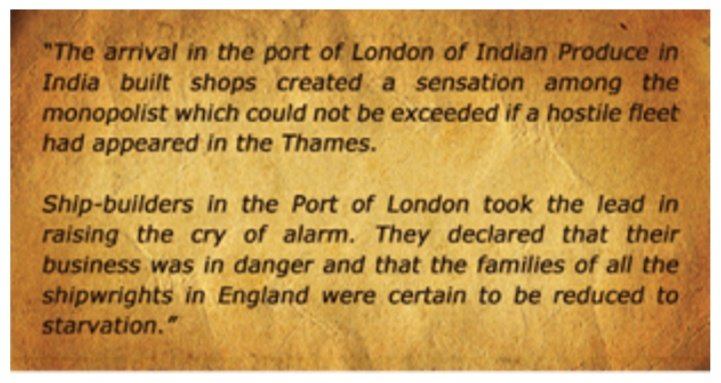
Short History of VOC.
Remark of Dr.Taylor, a noted historian of 19th century, in his book “Ancient and Modern India”
To safeguard the interests of the English shipwrights, Britain, after having gained supremacy over India and the world colonies, by enacting continuous laws,
Remark of Dr.Taylor, a noted historian of 19th century, in his book “Ancient and Modern India”
To safeguard the interests of the English shipwrights, Britain, after having gained supremacy over India and the world colonies, by enacting continuous laws,

one after another, broke the back bone of the Indian shipping industry. On 29th January, 1789, the British published in the Calcutta Gazette, a prohibition for building Indian ships for overseas trading.
By the late 1800s and early 1900s, the British had firmly entrenched themselves in the Indian seas and ports. No Indian could own ships. No Indian could ferry using ships. No Indian could trade using ships. No Indian manufactured goods could be traded using ships. 

The sea ports of India were literally sealed for any wholly Indian activity. The British controlled all. The British decided everything.
Besides crushing the shipping, ship building and trade industry of India, the British Protectionist Policies of 1800 CE destroyed what was left of Indian industry by way of killing manufacturing of textile, iron and steel and such other export worthy produces too.
For instance, British manufactured goods were imported into India at 2.5% duty. Other Foreign goods (Dutch) were imported into India at 15% duty
Without buckling down under such pressure, India, recalling its ethos of always being self-sufficient and self-reliant, embarked on a movement called Swadeshi, meaning
“Be Indian, Buy Indian”.
“Be Indian, Buy Indian”.
It was one of the first organized push towards “Make in India” against all odds, to counter the British monopoly then. But it was reinforced by the underlying spirit of Ahimsa.
The first tangible stir in this direction came from South India in the form of Swadeshi Steam Navigation Company, offering sailing services between Tuticorin in South India and Colombo in Ceylon.
It was a wholly Indian owned company started by V.O.Chidambaram Pillai, a Tamil barrister,who lived between 1872 and 1936 and was a disciple of the freedom fighter, Bal Gangadhar Tilak. Known as VOC for short, he started this navigation company to revive Indian shipping industry, 

in direct competition to the British shipping services and monopoly of the seas, he went on to purchase 2 ships, S.S.Galia and S.S.Lavo, by raising funds from all across India.
There literally ensued a tug of war between VOC’s shipping company and the British shipping company, with both lowering fares alternately to woo passengers.
At one point, the British even made the service free.
At one point, the British even made the service free.
Yet, when the Indians kept patronizing VOC’s services, as part of the Swadeshi spirit, the British charged VOC with sedition, stripped off his barrister license and sentenced him to 2 life terms, totalling 40 years. 

It was a Rigorous Imprisonment as meted out to a convict, where VOC was inhumanly, yoked to an oil press and made to toil in place of bulls, under the sun. 

VOC’s arrest brought the attempt to revive Indian shipping, to a grinding halt.
Such, was the punishment meted out to those, who tried to swim against the British tide.
Such, was the punishment meted out to those, who tried to swim against the British tide.
Many came into shipping after VOC.
Bengal Steamship Company, started in 1907 by Jyotindranath Tagore, the brother of poet Rabindranath Tagore.
Bengal Steamship Company, started in 1907 by Jyotindranath Tagore, the brother of poet Rabindranath Tagore.
Gujarat called Walchand Hirachand, in the month of April 1919.Scindia Steam Navigation Company Ltd. Walchand Hirachand setup Scindia Shipyard at Vishakapatnam.This shipyard later passed into the hands of the Government and now operates under the name Hindustan Shipyard Ltd. (HSL)
Credits and Source : @Bharathgyan 

• • •
Missing some Tweet in this thread? You can try to
force a refresh






